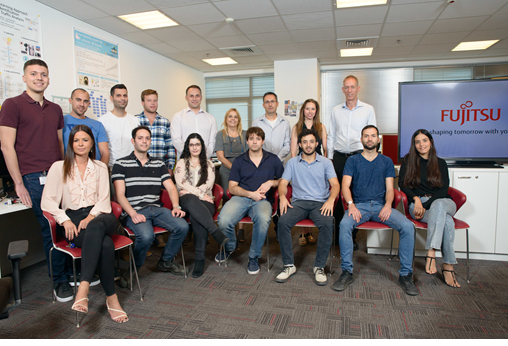Fujitsu and Ben-Gurion University Embark on Joint Research at New Center in Israel for Precise and Secure AI

BEER-SHEVA, Israel and Tokyo, Nov 16, 2021 – (JCN Newswire via SEAPRWire.com) – Fujitsu Limited and BGN Technologies, the technology transfer company of Ben-Gurion University of the Negev (BGU), have signed a three-year comprehensive joint research agreement to develop technologies and solutions to contribute to the realization of safe, real-world applications of AI and machine learning technologies. The newly-established “Fujitsu Cybersecurity Center of Excellence in Israel” (Fujitsu CCoE IL) hosts a team of approximately 20 researchers including Prof. Yuval Elovici and Prof. Asaf Shabtai. The lab is headed by Prof. Elovici, Department of Information Systems Engineering and Head of BGU’s Cyber Security Research Center located at the Cyber@BGU labs in the advanced technology park at the university’s campus in Israel.
 |
 |
With this initiative, Fujitsu and Ben-Gurion University aim to accelerate joint research and development into technologies that offer solutions to threats posed to AI models and machine learning, improving the trustworthiness and security of AI-based systems and software that increasingly impact our daily lives.
Vivek Mahajan, Chief Technology Officer of Fujitsu Limited commented, “We are delighted to collaborate with Ben-Gurion University, which boasts world-class software development capabilities in the security field. I’m confident that the establishment of the Fujitsu CCoE IL will yield a variety of promising new security technologies for AI, and I look forward to a fruitful partnership with Ben-Gurion University as we work in tandem to resolve some of the challenges facing our increasingly digitized society.”
Prof. Yuval Elovici, said, “We are excited to enhance our collaboration with Fujitsu, a world-leading information and communications technology company. Together we can make systems that are based on AI more robust to attacks that focus on the AI component.”
“This joint strategic research collaboration is a testament to Ben-Gurion University’s leadership in the cybersecurity space,” added Josh Peleg, CEO, BGN Technologies. “The multi-year collaboration will improve AI security and help create a safer world while strengthening the University’s positioning as a global player in the AI, machine learning and cybersecurity arenas.”
Growing Opportunities, Growing Threats
AI and machine learning technologies play a growing role in society, with promising applications emerging that will increasingly affect our daily lives, including the improvement of public safety through analysis of human behavior in surveillance video data, product quality control through the detection of abnormalities, product recommendations, as well as to improvement of autonomous driving.
With the growth and expansion of these technologies, however, the need to improve AI security represents an urgent priority. Hostile entities use increasingly sophisticated techniques to threaten critical infrastructure and systems by stealing and leaking confidential information contained in AI datasets. For instance, adding special noises to video data can cause the AI to misidentify people or misdetect actions. Fujitsu CCoE IL will address these issues through research on AI security to detect such attacks, protect against adversarial access to AI systems, and to make the models more robust against attacks.
As part of their new partnership, Fujitsu and BGU will focus on research that confronts these threats to make AI technologies safer and more trustworthy. For one of the Center’s initial research projects, researchers from Fujitsu and Ben-Gurion University will apply an AI model (Out of Distribution detection model (1)) that can detect new, unknown types of threats, such as attacks on drones and fraud in network communications and develop technologies able to appropriately cope with the rapidly evolving attack methods. The Out of Distribution detection model will additionally be applied to detect product malfunctions in cases where unexpected data appears intentionally or accidently.
Outline of the Joint Research
1. Length of contract: Three years
2. Roles and responsibilities:
Fujitsu:
Development of security technologies for AI-based systems and software
Examination of scenarios for technology verification
Support for verification and evaluation
Ben-Gurion University:
Development of security technologies for AI-based systems and software
Research, verification, and evaluation of security technologies for AI-implemented systems and software
3. Research Contents:
The two partners will conduct trials at the Fujitsu CCoE IL in Israel simulating various cases of security threats to AI and will promote advanced research toward the establishment of technologies to defend against such threats.
Future Plans
Fujitsu and Ben-Gurion University will promote research and development activities at the Fujitsu CCoE IL in order to realize AI security technologies applicable to a wide range of fields with the ultimate objective of delivering advanced solutions for the global market that will contribute to the solution of various social issues.
(1) Out of Distribution detection model:
Generic term for a model to detect data that has not been expected at the time of AI learning. One of the methods to deal with unknown data and used to detect new methods of cyber attacks and abnormalities of products.
About Fujitsu
Fujitsu is the leading Japanese information and communication technology (ICT) company offering a full range of technology products, solutions and services. Approximately 126,000 Fujitsu people support customers in more than 100 countries. We use our experience and the power of ICT to shape the future of society with our customers. Fujitsu Limited (TSE:6702) reported consolidated revenues of 3.6 trillion yen (US$34 billion) for the fiscal year ended March 31, 2021. For more information, please see www.fujitsu.com.
About Ben-Gurion University of the Negev
Ben-Gurion University of the Negev (BGU) is the fastest growing research university in Israel. With 20,000 students, 6,000 staff and faculty members, and three campuses in Beer-Sheva, Sde Boker and Eilat, BGU is an agent of change, fulfilling the vision of David Ben-Gurion, Israel’s legendary first prime minister, who envisaged the future of Israel emerging from the Negev. The University is at the heart of Beer-Sheva’s transformation into an innovation district, where leading multinational corporations and start-ups eagerly leverage BGU’s expertise to generate innovative R&D.
BGU effects change, locally, regionally and internationally. With faculties in Engineering Sciences; Health Sciences; Natural Sciences; Humanities and Social Sciences; Business and Management; and Desert Studies, the University is a recognized national and global leader in many fields, actively encouraging multi-disciplinary collaborations with government and industry, and nurturing entrepreneurship and innovation in all its forms. BGU is also a university with a conscience, active both on the frontiers of science and in the community. Over a third of our students participate in one of the world’s most developed community action programs. For more information, visit the BGU website.
About BGN Technologies
BGN Technologies is the technology transfer company of Ben-Gurion University, the third largest university in Israel. BGN Technologies brings technological innovations from the lab to the market and fosters research collaborations and entrepreneurship among researchers and students. To date, BGN Technologies has established over 100 startup companies in the fields of biotech, hi-tech, and cleantech, and has initiated leading technology hubs, incubators, and accelerators. Over the past decade, BGN Technologies has focused on creating long-term partnerships with multinational corporations such as Deutsche Telekom, Dell-EMC, PayPal, and Lockheed Martin, securing value and growth for Ben-Gurion University as well as the Negev region. For more information, visit the BGN Technologies website.
Copyright 2021 JCN Newswire. All rights reserved. (via SEAPRWire)
